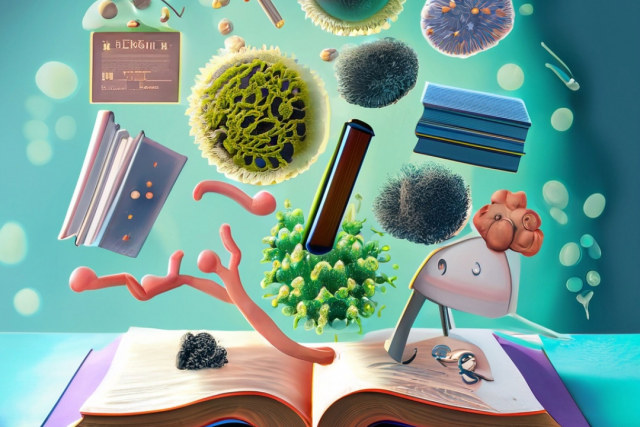Dec 08, 2023
Penn State researchers propose a path to authenticate the Microbiome Sciences
Penn State's One Health Microbiome Center is taking a lead role in the promotion of Microbiome Sciences as an autonomous discipline, publishing an editorial in the latest issue of PLOS Biology.

UNIVERSITY PARK, Pa.—In a new PLOS Biology Perspective, Penn State scientists have proposed the need to establish Microbiome Sciences programs in primary and higher education to validate the field as an autonomous discipline. The perspective, "It is time to authenticate the Microbiome Sciences with accredited educational programs and departments” by Nichole Ginnan, Research Project Manager at One Health Microbiome Center (OHMC), and Seth Bordenstein, Director of the OHMC, professor of Biology and Entomology, and J. Lloyd & Dorothy Foehr Huck Endowed Chair of Microbiome Sciences, was released on December 7.
The microbiome sciences have generated a wealth of knowledge over the past two decades, transforming our understanding of biology and contributing to a multi-billion-dollar biotech industry in the USA. However, owing to the interdisciplinary origins of the microbiome sciences, practitioners are scattered across disciplines such as botany and marine biology with often limited crosstalk. Ginnan and Bordenstein assert that creating formal programs at the graduate and undergraduate levels is the first step in unifying the field and receiving accreditation. By ratifying microbiome education with degrees and certificates, future generations of scientists will identify as “microbiome scientists” versus “a botanist who conducts microbiome research,” for example.
Their perspective outlines five steps that are key to accreditation. The first step is the development of degree-granting graduate programs in Microbiome Science, including doctoral and master’s programs. The second step is the development of Bachelor’s degree programs. Following the creation of degree programs, independent departments should be formed. The fourth step is the creation of microbiome courses and labs for high school curricula. Finally, the researchers propose that textbooks be revised for primary education to reflect an updated view of biology—balancing the importance of life that is both visible and invisible to the human eye.
“Establishing accredited degree-granting programs will enhance microbiome research rigor and reproducibility by standardizing training in this area,” said Ginnan. “Furthermore, a student’s and/or researcher’s “science identity” revolves around skills development and mastery of a discipline. Authenticating the Microbiome Sciences as an accredited discipline will validate expert interdisciplinary microbiome scientists who have long felt stuck in a limbo between two or more disciplines.”
Over time, the authors envision that the addition of microbiome science degrees, departments, and education curricula in pre-college and college venues will bolster public awareness and scientific literacy of the microbiome’s essential role in understanding human, agricultural, and environmental health. Doing so, they conjecture, could set microbiome science on a path similar to that of the genomics field, which started similarly as a biological tool and has matured dramatically, spawning accredited degree programs and the establishment of academic departments across a variety of professional sectors.